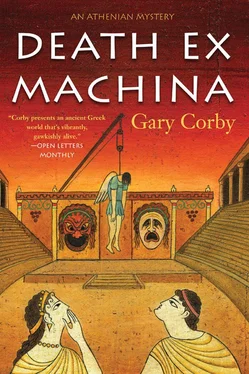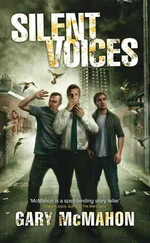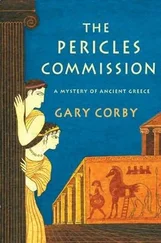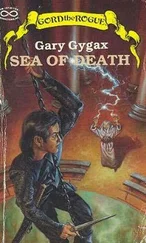Gary Corby - Death Ex Machina
Здесь есть возможность читать онлайн «Gary Corby - Death Ex Machina» весь текст электронной книги совершенно бесплатно (целиком полную версию без сокращений). В некоторых случаях можно слушать аудио, скачать через торрент в формате fb2 и присутствует краткое содержание. Год выпуска: 2015, ISBN: 2015, Издательство: Soho Press, Жанр: Исторический детектив, на английском языке. Описание произведения, (предисловие) а так же отзывы посетителей доступны на портале библиотеки ЛибКат.
- Название:Death Ex Machina
- Автор:
- Издательство:Soho Press
- Жанр:
- Год:2015
- ISBN:978-1-61695-520-5
- Рейтинг книги:3 / 5. Голосов: 1
-
Избранное:Добавить в избранное
- Отзывы:
-
Ваша оценка:
- 60
- 1
- 2
- 3
- 4
- 5
Death Ex Machina: краткое содержание, описание и аннотация
Предлагаем к чтению аннотацию, описание, краткое содержание или предисловие (зависит от того, что написал сам автор книги «Death Ex Machina»). Если вы не нашли необходимую информацию о книге — напишите в комментариях, мы постараемся отыскать её.
Death Ex Machina — читать онлайн бесплатно полную книгу (весь текст) целиком
Ниже представлен текст книги, разбитый по страницам. Система сохранения места последней прочитанной страницы, позволяет с удобством читать онлайн бесплатно книгу «Death Ex Machina», без необходимости каждый раз заново искать на чём Вы остановились. Поставьте закладку, и сможете в любой момент перейти на страницу, на которой закончили чтение.
Интервал:
Закладка:
“Yes.”
“Didn’t you ask what he meant?”
“Obviously I pressed him about it. It sounded to me like he had an enemy he feared.”
“Did he say whom?” Diotima asked.
“No, and when I pressed him he simply shrugged.”
It occurred to me that old, out-of-work actors probably didn’t eat well. I went back to the hole in the wall, and returned with a bowl of lentils and bread. It was the only food the woman behind the counter offered, served from a pot that rested on hot stones.
Kebris accepted the bowl as his due. As he ate, he said, “There’s another reason one actor might ask another to pick up his part. If he knows he’ll be taking on another role soon.”
“He’d only just got this one,” I pointed out.
“You are right.”
“Could Romanos have been planning to supplant Phellis?” Diotima asked.
Kebris smiled. “Actors do connive against each other. You wouldn’t believe some of the things I’ve seen in my years,” he said. “But I cannot think it of my friend. Besides, it is the choregos and the writer together who select a replacement.” He shook his head. “Not the outgoing actor.”
“But Lakon recommended Romanos for the second’s role,” Diotima said. “He was quite forceful about it.”
“Then Romanos suggested me,” Kebris added. “Or so I’m told. I’ll always be in his debt for that. To finish my career in a Great Dionysia is more than I ever hoped for.”
“Is there any other reason an actor might pass on his part?” Diotima asked Kebris.
He looked slightly uncomfortable and said, “Well, if an actor’s planning to skip town and he has a conscience, then he makes sure there’ll be someone to replace him.”
Kebris finished the last of his wine. “But I’m sure that can’t be the case with Romanos.”
“No,” I said politely.
“It can only be what I thought at first. That my friend expected an attack. Or perhaps he was more superstitious than I realized, and that he feared the ghost.”
As we left the grounds, Diotima frowned. “We have so little to work with, yet in a way we have too much. We know that someone was sabotaging Sophocles’s play. We don’t have a shred of evidence as to who it might be.”
“Right.”
“We know that Romanos was worried about something.”
“Yes.”
“We know that ended with Phellis taking a bad fall.”
“That’s presuming whoever booby trapped the machine on Phellis pulled the other tricks.”
“It does seem logical, doesn’t it? That might have been enough to halt the plays, except that Romanos worked like a slave to make the second actor’s role his own and to train the replacement third actor. It looked like the Great Dionysia was back on.”
“And then Romanos died,” I said. “There’s a lot to do. Where do we go next?”
She said, “Someone else lied to us, too. Lakon. Let’s go find out why.”
SCENE 23
Lakon lived in one of the fashionable streets north of the agora. His home was a narrow fronted building adjoined to the neighboring homes. The street in front was swept clean, which must have been the work of his slaves. Where some people placed a bust of Hermes outside their door, to wish good luck to travelers, Lakon had placed a bust of Dionysos.
We knocked on the door and were admitted by a polite house slave of older years. He took one look at Diotima and led us straight to the courtyard and brought us wine without even asking. Had I been alone, I would have been taken to the andron at the front of the house, but with a lady present the inner courtyard was the correct place for visitors. Lakon’s slaves knew their manners.
The dining couches on which we sat were old and probably cheap, but well cared for, and there weren’t any stains that I could see on the cushions. Vines had been trained up the columns that surrounded the open yard. The paved areas were swept. There weren’t any cobwebs in the corners.
Lakon was a man who cared about appearances. I was willing to bet there were no mice in his roof.
Lakon joined us after a respectable time had passed. He was wearing a large blousy chiton of soft fabric, with no belt to tie it in. It was the sort of thing a man might wear in the comfort of his own home: man shaped, but on the verge of effeminacy.
Lakon greeted us with politeness and a raised eyebrow. “Welcome though you are, I confess I wasn’t expecting you,” he said.
I said, “We were at the funeral of Romanos and we thought of you. In fact, we wondered why you weren’t also there.”
Lakon waved his arm in that airy manner of his. “As I told you, we weren’t that close.”
I said, “We’ve come across some information that appears to be a-how shall I put this?-a paradox.”
“Yes?” He waited. There was no concern in his voice.
I said, “We understand that you dined with Thodis, the choregos of your play.”
“So I did,” Lakon said. “Perhaps even more than once. Is that a crime? Perhaps you should bring me before the courts. Though come to that, isn’t it punishment enough that I’ve had to eat his ill-prepared feasts and endure whole evenings of his tedious conversation?”
“I was under the impression you enjoyed his company,” I said. “Thodis says so.”
Lakon laughed.
“Not that cultureless oaf. It was all I could do to prevent myself from falling comatose in the middle of his dreary conversation.”
“Then why-”
“Why did I flatter such a contemptuous man?” Lakon said. “It’s simple. I’m an actor. Actors are entirely dependent for their parts on men with no taste but lots of money.” Lakon leaned forward in his chair, the better to make his point. He seemed genuinely absorbed in the subject.
“You see, all plays-all of them, every single one-are funded by wealthy men. Most of these men have no idea about theater. Some know just enough to sound knowledgeable before their friends, and some, a mere handful, really do understand our art. Your friend Pericles is among the truly cognoscente, by the way.”
Of course he was, I thought sourly. Was there any subject on which Pericles wasn’t an expert?
“But all of these rich men,” Lakon went on, “every one of them thinks they can run a play better than the experts. Every one of them thinks they can write better than the writers and act better than the actors. They’re used to running large estates, you see. They tell their workers what to do, and the workers do it, and by next summer there’s a harvest. The rich think the theater works the same way. They think they need merely order ‘write a successful play’ and a successful play will be written to order.”
Lakon was passionately involved in his art, that was clear. He spoke quickly. I felt for the first time I was hearing his honest voice, and not a façade.
Lakon said, “In particular, every choregos thinks he can cast better than the writer.” He smiled. “Well, that’s hardly a surprise, is it? Everyone thinks they can cast better than the writer.”
I nodded, and so did Diotima.
Lakon saw that we followed his argument. He went on, “Writers must satisfy their choregos if they wish their works to be seen by an audience. So when a wealthy choregos suggests to a writer that Lakon would be the ideal protagonist for his play, the writer will simply agree, and hire me. Hence, I make myself agreeable to every man who might conceivably become a choregos.”
“Isn’t that cheating?” Diotima said.
“Young lady, I am telling you the deepest secret of the theatrical business,” Lakon said. “One toadies to the men with the money, and from that small beginning, all things follow.”
Читать дальшеИнтервал:
Закладка:
Похожие книги на «Death Ex Machina»
Представляем Вашему вниманию похожие книги на «Death Ex Machina» списком для выбора. Мы отобрали схожую по названию и смыслу литературу в надежде предоставить читателям больше вариантов отыскать новые, интересные, ещё непрочитанные произведения.
Обсуждение, отзывы о книге «Death Ex Machina» и просто собственные мнения читателей. Оставьте ваши комментарии, напишите, что Вы думаете о произведении, его смысле или главных героях. Укажите что конкретно понравилось, а что нет, и почему Вы так считаете.












